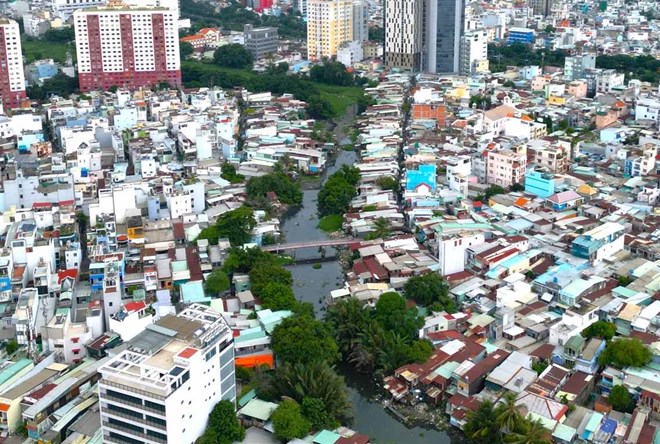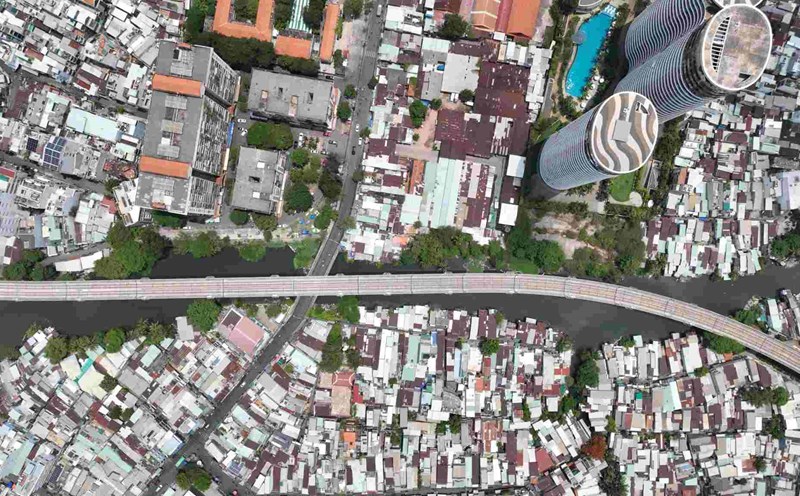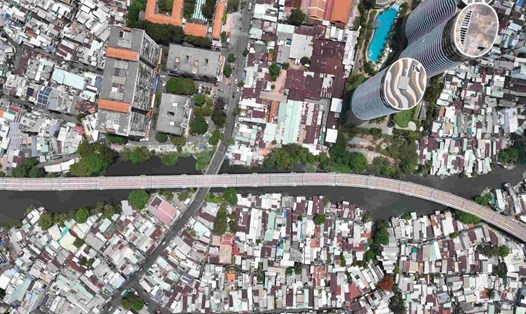The draft project to relocate all houses on and along rivers, canals and ditches has just been submitted by the Ho Chi Minh City Department of Construction to the Ho Chi Minh City People's Committee.
Ho Chi Minh City currently has 373 rivers, canals and ditches that have not been renovated in 16 districts and Thu Duc City, with about 46,000 houses needing to be relocated.
The districts with the largest number of houses needing to be relocated include District 8 (more than 13,700 houses), District 12 (more than 7,000 houses), Nha Be district (4,452 houses), District 7 (more than 4,000 houses), Binh Tan district (3,396 houses)...
Complicated legal procedures and unclear land legal status of many households are a major obstacle.
Many families do not qualify for resettlement and only receive partial support, making it difficult to convince them to hand over their land.
In particular, the majority of people in these areas are self-employed and have low incomes. They are concerned about their livelihoods and quality of life when they have to leave their old homes, places they have been attached to for a long time.
The lack of land in central areas makes it difficult to ensure on-site resettlement.
Ho Chi Minh City is relocating houses along canals in accordance with the provisions of the Law on Public Investment and the Law on Land, ensuring people's rights and effectively exploiting the cleared land fund. The goal is to create safe and sustainable living conditions with synchronous infrastructure and public services.
Depending on the characteristics of each canal, the implementation method is adjusted accordingly. Routes with the potential for expansion will create clean land for housing, commercial or park development.
Routes with only small land funds will be used to build green buildings, public spaces or develop tourism. For routes without clean land funds, the city focuses on dredging, infrastructure improvement, embankment and wastewater treatment, improving the quality of the living environment.

According to the draft project, the total estimated cost for the project is about 230,452 billion VND.
Of this, VND139,073 billion will be used for compensation, support and resettlement for eligible households. About 60% of these households will receive compensation and arrange new housing themselves, with an estimated average compensation of VND5.5 billion per house.
In addition, the city will invest 11,379 billion VND to build social housing for households that do not qualify for compensation. These households account for about 40% of the total number of households that need to be relocated, with the unit price of building apartments being 13.5 million VND/m², the average area of each apartment is 50m².
In addition, about 80,000 billion VND will be invested in upgrading technical infrastructure on canals.
Ho Chi Minh City expects to collect about VND160,480 billion from exploiting the surplus resettlement and social housing fund and auctioning land use rights at projects along canals.
However, the budget still needs to supplement about 69,971 billion VND, equivalent to 30.4% of the total budget.
To solve this problem, Ho Chi Minh City will allocate VND25,950 billion from public investment capital for the 2026-2030 period, while calling for public-private partnership (PPP) and auctioning ineffective land funds.
District 8 was chosen as the pilot area of the project, with resources focused on solving difficulties and building a model. Experience from District 8 will be the basis for other districts to implement the project in accordance with local characteristics.
The project aims to complete the relocation of all houses along canals by 2030, through three main phases: construction of resettlement houses and social housing (2025 - 2027), relocation of people (2025 - 2030), and urban embellishment combined with economic exploitation (2026 - 2030).











